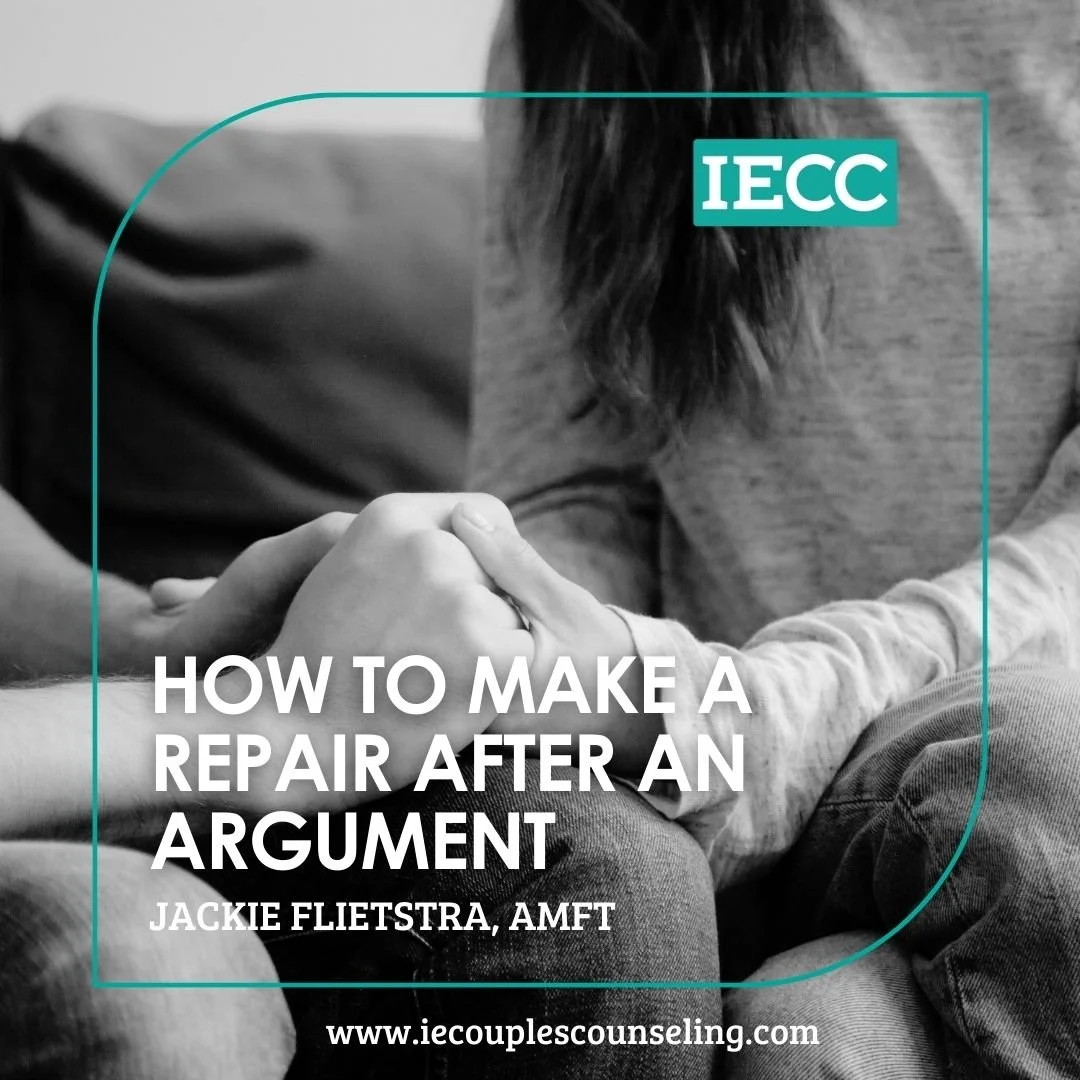How to Make a Repair After an Argument with Marriage Counseling in Temecula Ca
It is not uncommon for couples to struggle in conflict and need multiple attempts or conversations to move through an issue. Even in our best attempts to communicate with each other, we sometimes miss each other or walk away from the conversation feeling more disconnected or hurt than before we started.
And when the conversation isn’t going well, we often need to take a healthy time-out. For more details on how to take a time out, refer to my last blog here.
But how can we come back to the conversation again for a re-do after we’ve taken a timeout?
As a couples therapist, I have found that even after a time out is taken, my couples cannot just push a “reset” button and forget about the hurt that was caused from their previous conversation. For many people, it will not feel safe to give their partner a re-do until a “repair” has been made.
So you might be asking, what is a repair? To break it down in a simple way, I use 3 A’s to describe what a repair is or looks like:
Acknowledgement
Acknowledge what happened in your previous attempt to communicate with your partner by owning YOUR part of the conversation. Yes, I said it - your part! Even if you think you were only 1% at fault for the miss, own your 1%. This could look like taking responsibility for being short tempered, raising your voice, being distracted, feeling tired, feeling confused or communicating in a confusing way, being undecided, etc.
Apology
First, let me clarify that saying “I’m sorry” can mean two things: the most common expression of this type of apology can mean an admittance of wrongdoing or being at fault. The second use of the expression “I’m sorry” can be an expression of sympathy or sorrow of someone's pain (i.e. We commonly say “I’m sorry for your loss” to a friend when a loved one has passed, even though we aren’t at fault for their passing). Whichever meaning resonates with you, let your partner know that you care about their hurt from the previous conversation with an apology that makes sense to you.
Asking for a re-do
Asking for a re-do is one of the most crucial parts of getting access to a re-do. Sometimes we need time to process our anger or hurt, even when an acknowledgement or apology is given. In addition, asking for a re-do is a kind way of letting your partner decide or have consent as to when or if they are ready to try again. Lastly, asking for a re-do saves you the heartache of spinning your wheels to try again if your partner isn’t ready.
Even though I broke down a repair in 3 small steps, it can be really difficult to do with your partner. In my experience as a couples therapist, giving a repair can feel like “extra” work that most people typically don’t have practice with - in couples therapy I can help you and your partner learn this new skill until it becomes a habit.
Remember, even healthy relationships have conflict that doesn’t go smoothly 100% of the time. The skill of a repair is so necessary for us to get re-do’s so that our hurts don't turn into years of unresolved hurt or resentment. If you and/or your partner would like help learning how to give a repair - let us know! We offer free consultations and would love to help you!
Quality marriage counseling in Riverside CA, Temecula CA, and online couples counseling in California
At Inland Empire Couples Counseling we offer the best marriage counseling we can! Our couples therapists are trained in helping couples heal from infidelity, substance use in relationships, childhood trauma, communication skills, as well as providing the LGBTQIA+ community with pride counseling. We have online couples counseling in California. We have couples therapy in Riverside, CA. We also have marriage counseling in Murrieta CA or the Temecula Valley. Please reach out for help by clicking the button below to schedule a free 15 minute consultation with our Intake Coordinator.
Have questions about couples counseling? Visit our FAQs page to find out more.

